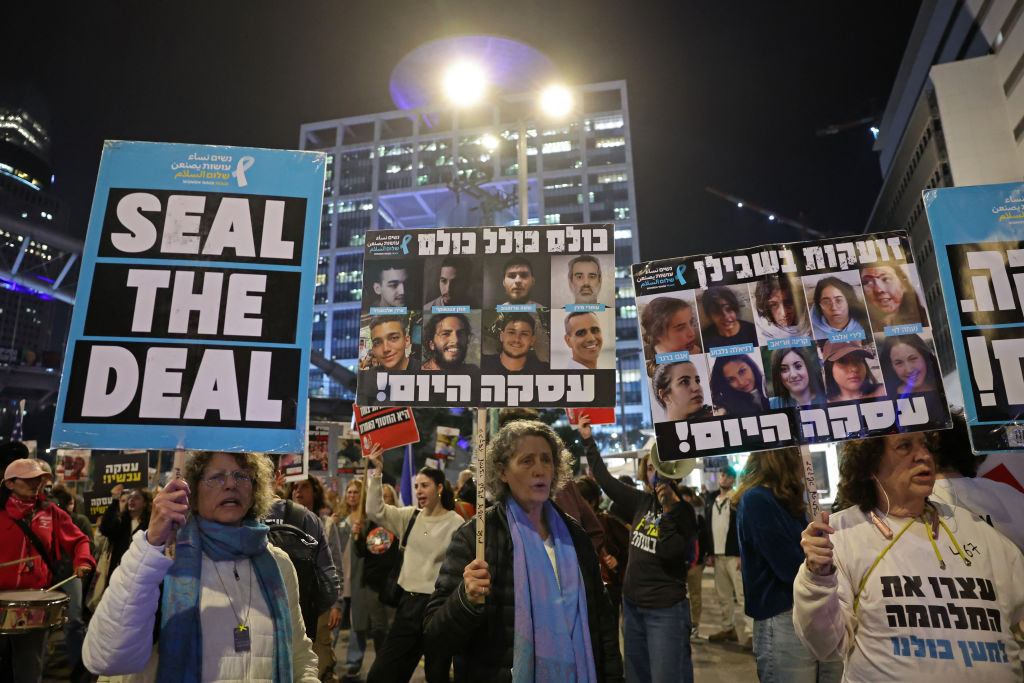Happy Thursday! The coyote scourge continued in Chicago this week after United Airlines confirmed that one of its flights was forced to return to O’Hare International Airport after striking one of the varmints during takeoff. We thought they would’ve learned by now not to mess with airplanes.
Quick Hits: Today’s Top Stories
- President Joe Biden and President-elect Donald Trump each announced Wednesday that Israel and Hamas had agreed to a phased ceasefire and hostage deal, setting the stage for the end of the 15-month war that began with the terrorist group’s October 7, 2023, attack. In the first phase, Israel will withdraw its forces from most areas of Gaza, Hamas will release 33 hostages—including Americans—and Israel will release hundreds of Palestinian prisoners. During the six-week pause in fighting, Israel will negotiate the second phase, which includes a permanent end to the war and the release of all hostages. Biden stated that the ceasefire would extend as long as needed for negotiations to continue. Hamas confirmed its approval of the deal on Wednesday, but Israeli Prime Minister Benjamin Netanyahu said Thursday morning that the group had reneged on some of its terms. At the time of publication, the Israeli cabinet had not yet voted to approve the agreement.
- Polish Prime Minister Donald Tusk accused Russia of planning terrorist attacks against airlines around the world. Speaking at a news conference Wednesday with Ukrainian President Volodymyr Zelensky, Tusk did not elaborate on whether the terror threat was ongoing. Russian operatives field-tested explosives throughout the summer, detonating devices in Germany, Poland, and the United Kingdom in what Western officials believed were trial runs for a larger attack. Tusk’s revelations followed a report by the New York Times on Monday, which found that U.S. officials in August discovered a Russian plot to smuggle explosives onto cargo planes bound for the U.S. and conveyed to President Vladimir Putin that Washington would hold him responsible for “enabling terrorism” in the event of such an attack.
- With rescue efforts now concluded, South African authorities confirmed on Wednesday that at least 78 people died in a standoff between police and miners at an illegal gold mine. Beginning in at least November, police had sealed the mine’s entrances and blocked shipments of food and water to force the illegal miners to leave, and on Monday, a court-ordered rescue operation searched for anyone left underground. At least 200 survivors were pulled from the shaft. With unemployment at 42 percent in South Africa and political instability plaguing the region, thousands have resorted to looking for gold in abandoned mines. The South African government says that the unsanctioned mining costs the country more than $1 billion a year.
- Biden delivered his farewell address from the Oval Office Wednesday night, highlighting the policy achievements of his one-term presidency. But, in a thinly veiled shot at President-elect Donald Trump, Biden dedicated much of his speech to painting a dark picture of the country’s trajectory. “Today, an oligarchy is taking shape in America of extreme wealth, power, and influence that literally threatens our entire democracy, our basic rights and freedoms, and a fair shot for everyone to get ahead,” he said. Biden warned of the dangers of “an avalanche of misinformation” and the “potential rise of a tech-industrial complex,” and called for term limits on Supreme Court justices and a constitutional amendment “to make clear that no president is immune from crimes that he or she commits while in office.”
- The Biden administration unveiled a plan on Wednesday to reduce the nicotine in cigarettes by 95 percent to make smoking less addictive. According to projections by the Food and Drug Administration, the changes could help nearly 13 million people quit smoking within a year. The policy—similar to one proposed during the first Trump administration—comes just days before President Biden leaves office, leaving the plan’s ultimate fate in the hands of the incoming administration. The same day, the FDA officially banned Red No. 3 from food, drinks, and drugs—more than 30 years after the synthetic dye’s use was prohibited in cosmetics for causing cancer in lab animals.
- The Consumer Price Index rose 0.4 percent month-over-month and 2.9 percent annually in December, the Bureau of Labor Statistics reported Wednesday, up from 0.3 and 2.7 percent in November but short of economists’ expectations. The Federal Reserve has a long way to go to reach its 2 percent inflation target, but officials are still expected to hold interest rates steady when they meet later this month.
A Hostage Deal—Maybe

TEL AVIV, Israel—Crowds of protesters gathered on Tel Aviv’s Begin Street last night, as they’ve done every week since the 15-month war’s start to demand the release of Israeli abductees from Hamas captivity. But the mood was one of celebration, not anger, as reports of a long-awaited ceasefire and hostage release deal began to trickle out.
Just after 7 p.m. local time, President-elect Trump announced on Truth Social that Israel and the terror group had reached “A DEAL FOR THE HOSTAGES IN THE MIDDLE EAST.”
Two hours later, President Joe Biden delivered a speech outlining the ceasefire agreement his administration worked for more than a year to reach. “We’ve had many difficult days since Hamas began this terrible war,” he said. “We’ve encountered roadblocks and setbacks. We’ve not given up, and now, after more than 400 days of struggle, the day of success has arrived.”
That success looked less certain in the cold light of day. Israeli Prime Minister Benjamin Netanyahu postponed a planned cabinet meeting to vote on the deal this morning, saying Hamas had reneged on some of its promises “in an effort to extort last-minute concessions.” At the time of this newsletter’s publication, Israel had not formally approved the agreement. But if the sides are able to overcome the eleventh-hour crisis, this deal could bring calm, at least temporarily, after more than a year of upheaval in the Middle East.
The phased agreement would begin with the release of 33 Israeli hostages from the humanitarian category—which includes women, children, the wounded, and men over the age of 50—over the course of a six-week pause in fighting. During the same period, the Israeli Defense Forces (IDF) would begin to pull troops from portions of the Gaza Strip and allow Palestinians to return to northern Gaza. Israel would also free 1,000 Palestinian prisoners, including hundreds of convicted murderers, from its prisons.
On the 16th day of the deal, the two sides would begin negotiations for phase two, which would, in theory, bring about a full Israeli withdrawal from Gaza and the release of all remaining hostages. An estimated 98 abductees, half of whom are believed to be alive, are currently being held by Hamas. Seven Americans are among them.
The announcement of an agreement followed days of intensive negotiations in Doha, Qatar, at which both Trump and Biden’s representatives were present. The incoming and outgoing leaders each took credit for the diplomatic breakthrough following more than a year of failed talks. The ceasefire “could have only happened as a result of our Historic Victory in November,” Trump claimed, as supporters pointed to his December threat that there would be “HELL TO PAY” if the hostages weren’t released by his January 20 inauguration. Biden, meanwhile, pointed out that the ultimate deal was based on a draft proposal his administration put forward in May.
But while the Biden team stayed deeply involved in the push to reach a ceasefire, the president’s public rifts with Israeli leaders often interfered with that goal by reinforcing Hamas’ belief that it could wait out its enemy amid mounting international pressure. A pivotal moment came last spring, when the U.S. urged Israel not to seize Rafah—Gaza’s southernmost city where an estimated 1.5 million people were living and sheltering at the time—over concerns of catastrophic humanitarian consequences.
Israel evacuated civilians from the area and moved forward with its attack anyway, insisting that military pressure was the best way to force Hamas into a hostage deal, as was the case in November 2023 when a temporary truce secured the freedom of 105 hostages. And in October, Israeli troops killed Hamas leader and October 7 mastermind Yahya Sinwar in a firefight in Rafah. His death was the most meaningful blow in a war that, for any normal military organization, was marked by a series of catastrophic defeats. In 15 months of fighting, the IDF said it killed more than 17,000 Hamas operatives, including top commanders and political leaders.
But Hamas is no ordinary military organization. The terrorist group replaced its slain leader with his brother, Mohammed Sinwar, who quickly made clear that he shared Yahya’s messianic goal of eradicating the Jewish state—even at the cost of Palestinian suffering. U.S. officials tried and failed again to end the war as ceasefire negotiations dragged on.
It’s unclear what began to turn the tide. Perhaps it was Trump’s November victory and subsequent threats of “hell to pay,” or perhaps it was Israel’s own staggering successes against Hamas’ main backer in the region: Iran.
Starting in the early fall, the IDF shifted its focus north—to the war with Iran’s main proxy, Hezbollah, which began firing on Israel on October 8, 2023, in solidarity with Hamas. The brief campaign witnessed some of Jerusalem’s most dramatic military feats to date, from the decimation of the terrorist group’s arsenal and the targeted killing of its longtime leader, Hassan Nasrallah, ending in November with an unfavorable deal for Hezbollah. During the same period, Israel demonstrated its willingness and ability to carry out precision airstrikes on Iran itself, and Tehran’s main state ally—the Assad regime in Syria—met its inglorious end.
The string of Israeli successes signaled to Hamas that nobody was coming to its rescue, while also giving Netanyahu at least some political cover to pursue a deal opposed by some segments of Israeli society. One of Netanyahu’s far-right coalition partners, National Security Minister Itamar Ben-Gvir, has threatened to withdraw from the government in response to the latest ceasefire agreement and urged others to do the same.
If it becomes permanent, the deal could effectively leave Hamas in power in the Gaza Strip—a non-starter for Israelis at the war’s start. Armed Hamas fighters took a victory lap before the agreement even took effect, parading through the streets of the war-torn enclave Wednesday to celebrate their “success” in a war that began with the massacre of Israelis and left tens of thousands of Gazans dead. In remarks hailing the ceasefire, senior Hamas leader Khalil al-Hayya said that October 7 would “forever be a source of pride for our people.”
“For terrorist organizations like Hamas, defeat doesn’t exist. Because the objective is merely to survive, and they have survived,” Chuck Freilich, Israel’s former deputy national security adviser, told TMD. “Now, they’ll spend the next few years trying to rebuild.”
In Israel, reactions to the news have been decidedly more mixed, ranging from euphoria to trepidation to outright anger. While many Israelis are grateful to get at least some of their captives home, others fear that a deal that frees only some of them in the first phase may ultimately leave the remaining hostages behind. Others are asking why, after a costly 15-month war, the government would enter into an agreement that risks leaving Hamas in power and releases convicted murderers in exchange for civilians. “A freed terrorist is tomorrow’s murderer,” demonstrators in Jerusalem chanted Tuesday night.
And the hard part is still yet to come. If the deal moves forward, the first living abductees could walk free as soon as Sunday, after more than a year of unimaginable physical and psychological torture. Others will return in coffins. Seeing hostages emerge will mark Israel’s first step in healing the national trauma that began on October 7, but it will also serve as a painful reminder of why the war was fought in the first place—and how very far the two sides are from lasting peace.
Worth Your Time
- Writing for Works in Progress, economics professor Carola Conces Binder unpacked the history of the tool we use to measure inflation, the consumer price index (CPI). “The CPI and related measures affect monetary and fiscal policymaking and are often used to adjust Social Security payments, income tax brackets, and wages for millions of workers,” she wrote. “Because of these far-reaching impacts, even relatively small changes in the measurement of the CPI can have major implications for households, firms, and the government’s budget. Thus, the technocratic task of measuring the price level is often at the center of political controversies. The evolution of inflation measurement in the United States has reflected both technical progress and these political forces.”
- Cal Newport—the anti-social media computer science professor and author of books like Deep Work and Digital Minimalism—detailed his experience of joining TikTok in an essay for the New Yorker. “A decade ago, I viewed social media as Manichaean: these platforms could distract and mislead their users, but they could also topple dictators and enable free expression,” he wrote. “But much of the content on TikTok, and on comparable services like Instagram Reels and YouTube Shorts, borders on nihilism. It seems to revel in meaninglessness, sometimes even poking fun at the idea that a video should be useful. The most popular platforms are saying the quiet part out loud—that there is no deeply meaningful justification for their digital wares—and their users seem to understand and accept this new agreement.”
Presented Without Comment
BBC: AI Brad Pitt dupes French woman out of 830,000 Euros
Also Presented Without Comment
First Lady Jill Biden told the Washington Post about her disappointment with Nancy Pelosi’s role in pushing her husband to drop out of the 2024 election:
“Like I said,” Jill says now, seated in the Green Room of the White House on the first Sunday of January, “I’ve been thinking a lot about relationships.”
…
“It’s been on my mind a lot lately, and — ” Jill pauses. “We were friends for 50 years.” She is using her teacher’s voice now. “It was disappointing.”
Also Also Presented Without Comment
Axios: Georgia Group Founded by Stacey Abrams Fined for Campaign Finance Violations
In the Zeitgeist
We’re not sure how we feel about the new indoor golf league called TGL. But watching a professional golfer skull a shot that but for hitting the flagstick could have nailed a spectator is pretty fantastic content.
The cherry on top was watching the tears of laughter from the GOAT.
Toeing the Company Line
- In the newsletters: Scott Lincicome unpacked (🔒) how poor policies and bad incentives worsened the destruction and consequences of the Los Angeles fires, Nick Catoggio explored (🔒) how long Donald Trump’s political honeymoon could last, and Jonah Goldberg argued (🔒) that corporate America isn’t healing, it’s just embracing the latest form of cronyism.
- On the podcasts: Jonah Goldberg is joined by Hal Brands on The Remnant to discuss his latest book The Eurasian Century: Hot Wars, Cold Wars, and the Making of the Modern Century and in the latest edition of Advisory Opinions, Sarah Isgur and David French discuss the oral arguments in the Supreme Court case on the Texas law requiring age-verification for porn sites.
- On the site: Kevin Williamson argues that Republicans are better than Democrats at state-level governance.
Let Us Know
Do you think the ceasefire deal is a good one? Does Israel have any alternatives?









Please note that we at The Dispatch hold ourselves, our work, and our commenters to a higher standard than other places on the internet. We welcome comments that foster genuine debate or discussion—including comments critical of us or our work—but responses that include ad hominem attacks on fellow Dispatch members or are intended to stoke fear and anger may be moderated.
With your membership, you only have the ability to comment on The Morning Dispatch articles. Consider upgrading to join the conversation everywhere.